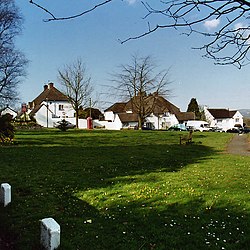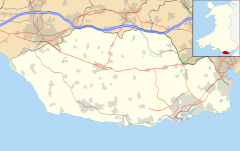Pendoylan
Pendoylan
|
|
|---|---|
 |
|
| Pendoylan shown within the Vale of Glamorgan | |
| Area | 5.8 sq mi (15 km2) |
| Population | 464 (2011) |
| • Density | 80/sq mi (31/km2) |
| OS grid reference | ST060767 |
| • Cardiff | 7 miles (11 km) East |
| Civil parish |
|
| Community |
|
| Principal area | |
| Ceremonial county |
|
| Country | Wales |
| Sovereign state | United Kingdom |
| Post town | COWBRIDGE |
| Postcode district | CF71 |
| Dialling code | 01446 |
| EU Parliament | Wales |
| UK Parliament | |
| Welsh Assembly | |
Pendoylan (Welsh: Pendeulwyn meaning 'head of two groves') is a rural village and community (parish) in the Vale of Glamorgan, Wales. The village has won many awards in Best Kept Village competitions and contains 27 entries in the Council's County Treasures database, 13 of which are listed buildings.
The area of the community of Pendoylan, some 1500 hectares, is situated between the A48 road and the M4 motorway in the Border Vale. It slopes down from an escarpment in the west, the site of Hensol Forest, and is bounded in the East by the River Ely. Tredodridge lies to the northwest.
The area is rich in history. There is evidence of prehistoric activity in two cooking mounds in the east and there is a motte with possible signs of a bailey in the north. The parish church, which is dedicated to St Cadoc (born circa 497), may well have been founded in his lifetime and there is a well named after him and one after St Teilo. The fertile land at Caerwigau was acquired by the Norman de Bonvils and in the twelfth century, 40 acres (160,000 m2) were granted to the Knights Hospitallers who rented it out to the monks of Margham. They later acquired further land and erected a chapel in the 12th century. There is a well-preserved moat from a 13th- or 14th-century homestead at Caerwigau. In the 14th century a family known as “Llewelyn of Caerwigga” were established. The old manor house was founded in Tudor times and stands today as Caerwigau Isaf, a Grade II listed building. The first record of a priest of Pendoylan is early in the 13th century. He is one “Urban” “Sacredos de Pondewelin” but there is a fairly complete list of incumbents from Elizabethan times.
...
Wikipedia

